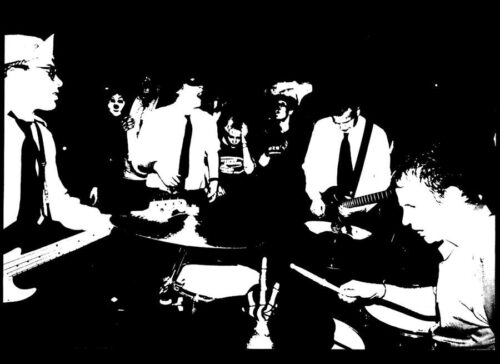
After an official reunion last year, hardcore / screamo legends Orchid are set to tour the West Coast next month for their first shows there in over 22 years. Following a string of sold out East Coast dates, The Doom Loop Tour continues west, kicking off in Seattle on February 10 and runs down the coast to Portland, San Francisco and the Los Angeles area. Each night includes a special handpicked lineup including support from Iron Lung, Great Falls, Physique, Bastard Noise, Regional Justice System, Agriculture and more. It’s rumoured that more dates will be announced soon… For more info and tickets go here.
2/10: Seattle, WA – Substation
(w/ Iron Lung, Great Falls)
2/11: Portland – Revolution Hall
(w/ Iron Lung, Great Falls, Physique)
2/13: San Francisco – Great American Music Hall
(w/ Jerome’s Dream, Strangelight)
2/15: Los Angeles, CA – The Belasco
(w/ Jerome’s Dream, Bastard Noise, Regional Justice Center)
2/16 Pomona, CA – The Glass House
(w/ Agriculture, Habak)
Zach Lipez wrote a really cool piece about the band.
It’s a little known bit of punk lore that when Bruce Springsteen wrote “everything that dies someday comes back,” he was specifically referring to the reunion of the New England band Orchid. Maybe the Boss was a prophet, maybe I’m lying, or maybe Orchid’s obsessions (black jeans rather than blue, roller rinks, mixtape nostalgia, a finely tuned localized pain) were more universal than their niche adoration implies. Maybe—if young lads acting out, made old by a cruel, cruel world, is a recurring feature—New Jersey predicts Valhalla.
If this reads cute, fine. Orchid was always half overreach (ambition to transcend whatever you got, a refusal to settle for mere hardcore striving), with an irresolvable tension between staunch/arch integrity and proto electroclash horniness. The other half of Orchid was an infinitely propulsive monument to chaos. Whether one prefers one half to the other probably depends on the notches on one’s library card. But the band, in their totality, was pure explosion.
The band’s story began with Jayson Green, Will Killingsworth, and Brad Wallace at Hampshire College, a small school where students with signifying t-shirts might find each other (in Jayson’s recollection, Will was wearing “probably something cool like His Hero Is Gone” and Jayson was wearing “some Connecticut hardcore like, I dunno, Fastbreak. Probably Hatebreed…”). After completing the then common hetronormative bonding ritual of trading mixtapes, Will eventually suggested they start a band. Stars so aligned, what followed was an American story so well tread as to verge into archetypal: Jeff Salane was recruited, the band recorded a demo, played a show at the legendary Hampshire College Tavern, and got asked to do a split with Pig Destroyer. In the biopic, Scott Hull is played by Tom Hanks.
Regarding “screamo,” “emo-violence,” or any genre designation and the band’s place within it, that particular blood on Orchid’s hands is complexified. While memory may place the band as part of the San Diego/Pacific NorthWest tradition of white belts and tight pants, the truth is that “Salane, our drummer, was like an indie kind of guy. He sang and played guitar as well as he played drums (which is very good), while Will and Brad came from a crust grind background. Garlock is like a classic hardcore background guy, you know?” Jayson says, comparing the band aesthetics to old photos of Black Flag, where it was like “how do these people even know each other?”
Sonically, the band was unabashed in their attempting to worth within a then nascent tradition of heavy, shambolic, abruptly gorgeous hardcore-adjacent cacophony who captured the aggression of punk, while shying away (in their playing if not their record / t-shirt collections) from the bully-barking which made up so much of the genre. Of course, as the KLF recommends, in attempting to sound like their social betters, Orchid made something—jaggedly melodic leads and self-lacerating, witty preachifying over blast beats—entirely their own.
While they existed, Orchid took on the scene—past, present, and future—with reverence, contempt, and joy. That was Orchid’s approach; taking the dead horse of hardcore and breathing life into it by poking it, prodding it, loving up on it, scrawling situationist slogans on its corpse like they were itchy runes, till the dead horse had no choice but to get up and gallop around the all-ages venue.
After Orchid broke up, the individual members kept their boots on the ground in other projects. Instead of the years creating an insurmountable distance, the band remained close friends. With two decades of reunion disavowals slightly undermined by that absence of schism.
When asked to rate the improbability of Orchid’s reunion, on a scale of 1-10 Fugazis, Green rejects the metric, seeing Orchid’s reuniting as somewhat less “world imploding” than Fugazi getting back together, while making clear that upcoming touring was made possible by the band members’ common bond.
“We’ve been offered stuff forever. Everyone’s got their own stuff going on and it never appealed,” Jayson says. “Finally, I remember talking to Damien Abraham from F*cked Up and he said, ‘You like the guys?’ And I was like ‘Yeah.’ Then he’s like, ‘Do you like the songs?’ And I was like, ‘Yeah.’ And he goes. ‘So what’s the problem?; And I was like, ‘Huh. That’s a good point.’”
“Then Brad said, ‘you know, I’m kind of ambivalent about reuniting… But I think, when we’re on our deathbeds, we’re not going to be like, I’m sure glad we didn’t reunite Orchid!’”
That was also a good point.
Sure, nostalgia is a corpse to be danced on, but now, with passion being passé still being up for debate, Orchid’s brand of sloganeering—revolutionary love backed by force and caustic rhythms—is a welcome addition to the hell-discourse. Either way, the band—dastardly anti-fash futurists and anti-trad traditionalists that they gleefully and paradoxically are—have returned…ready to revel in the confusion.







